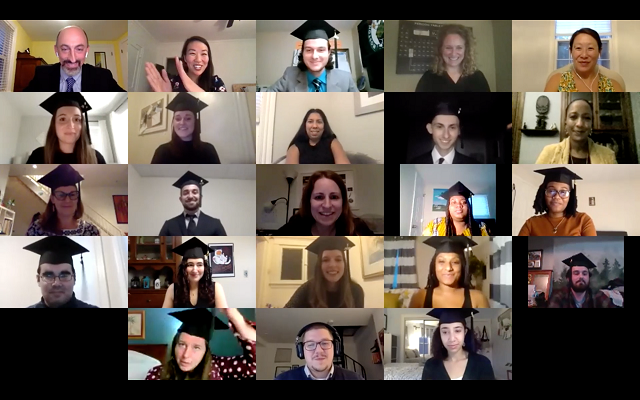
Jan 5, 2021 12:00:00 AM
When schools across the nation shuttered their facilities to safeguard against the spread of COVID-19, all teachers were forced to make an immediate pivot to remote instruction. Those early days and months of the pandemic were fraught with uncertainty for educators who had, as a result of their experiences and training, only been accustomed to in-person teaching and learning.
At the Charles Sposato Graduate School of Education, an educator preparation program in Boston focused on training teachers via a residency model, we knew that we had to quickly understand and mobilize around the appropriate methods for preparing educators to be successful in the remote setting. Now, after much trial and error over the course of the better part of a year, we have a clearer picture of the specific considerations that school leaders should take into account when hiring novice teachers to teach in remote environments.

Our approach to preparing teachers has always been aligned with our values: strengthen the team, invest in relationships and strive for excellence. In the remote environment, we’re finding that close alignment with the Sposato values is essential to not only the development of effective teaching practices, but also to the environments—whether in-person or virtual—those newly prepared novices will step into as lead teachers.
We offer the following insights to school leaders who are understandably challenged by the prospect of hiring remote teachers into school communities with new modes of teaching and learning.
It’s widely understood that novice teacher induction is an important part of the beginning teacher experience, providing support for acclimating to unfamiliar school environments and useful instructional guidance.
[pullquote]In the remote learning context especially, comprehensive webs of support for new teachers are crucial because the risk of social and professional isolation is magnified.[/pullquote] Sposato collaborates with school leaders and other staff at our partner sites to ensure that trainees are adequately coached, mentored, advised and managed during their residency year. The result is a carefully crafted web of support for each trainee, comprised of distinct elements that are inextricably linked in both purpose and practice.
One of the more interesting things that we’ve noticed in this year of remote instruction is the potential for reciprocity that’s embedded within the mentor-trainee dynamic. Teaching today requires a greater level of technological skill than ever before, and experienced teachers may face a steep learning curve with regard to instructional technology and learning the ins and outs of new and unfamiliar technological platforms. Novice teachers, too, must contend with these challenges; however, many are well-versed and skilled in the technological arena, having had access to the Internet for most, if not all, of their lives.
As school leaders welcome new teachers into their community next school year, we urge them to [pullquote position="right"]consider the unique assets that novices possess, and effectively leverage them to enhance staff development overall.[/pullquote]
Investigating and leveraging the unique assets of novice teachers would be impossible without established relationships because they’re at the core of what makes new teachers feel valued and appreciated. These strong relationships proved helpful this year as leaders at one of our partner sites balanced formally gathered survey data with what they learned from informal online conversation to conclude that some of our trainees were catching on to the new software systems more quickly than the veteran staff. As a result, these trainees—with help from a veteran instructional coach—planned and led professional development for the entire staff during their second week on the job!
Sposato prioritizes building relationships with our residents, even when we can’t connect with them in person. Here are a few strategies that have served us well in both virtual and brick-and-mortar environments:
Keep in mind that new teachers won’t be master teachers by the end of the semester! An incremental approach to outcomes has proven more effective than expecting them to get better at everything at once. At Sposato, we have a radical growth mindset when it comes to adults, believing that great teachers are developed through direct support and ongoing coaching.
We provide a great deal of coaching support to get teachers ready for the classroom. Each time one of our trainees step (or “Zoom”) in front of students, a coach or mentor teacher is also there to observe and provide feedback. Our coaching model is built around making small, actionable changes that will have a significant impact over time. Each coaching session focuses on one small action, like, giving clear directions, establishing a strong presence while delivering online instruction, or effectively utilizing online breakout rooms to conduct quick, informal conversations with students during independent practice. All of these discrete skills, however minor, have a cumulative effect on our new teachers’ development.
While school leaders tasked with hiring for the fall may not have had the resources to implement full-on coaching models, we do know that staff training and development constitutes a typical and necessary part of yearly planning in most schools. With that in mind, we urge school leaders to leverage the resources at their disposal—as well as the advantages afforded through new technologies—to [pullquote]develop protocols for ensuring that new teachers are fully supported in making incremental improvements to their practice.[/pullquote] With strategic and deliberate planning, your new teachers can surely thrive.
Dr. Jalene Tamerat is Dean at the Charles Sposato Graduate School of Education in Boston, Massachusetts. Prior to joining Sposato, Dr. Tamerat worked for three years as the Director of New Teacher Development for Boston Public Schools. She began her career in education in 2003 as a classroom educator in BPS, teaching core subjects such as science, mathematics and social studies at the middle school level. Dr. Tamerat holds an Ed.D. from Boston University, an Ed.M. from Harvard University, an M.A.T. from Emmanuel College, and a B.A. from the University of Massachusetts Amherst.
Few issues in education spark more tension and debate than standardized testing. Are they a tool for equity or a burden on students? A necessary check on school systems or a flawed measure of...
Charter schools are public schools with a purpose. Operating independently from traditional school districts, they're tuition-free, open to all students, and publicly funded—but with more flexibility...
Despite the benefits of a diverse teaching force, prospective teachers of color fall out of our leaky preparation pipeline at every stage: preparation, hiring, induction, and retention. Here’s what...
Ed Post is the flagship website platform of brightbeam, a 501(c3) network of education activists and influencers demanding a better education and a brighter future for every child.
© 2020-2025 brightbeam. All rights reserved.
Leave a Comment